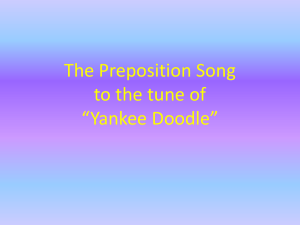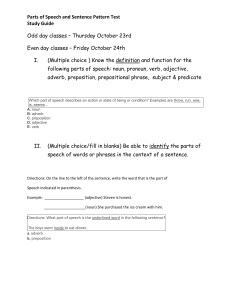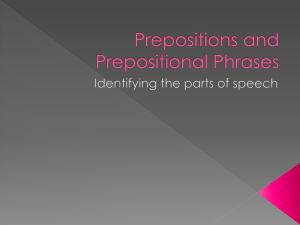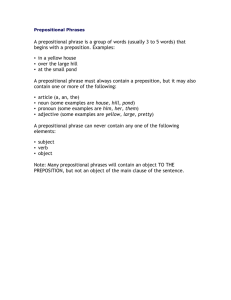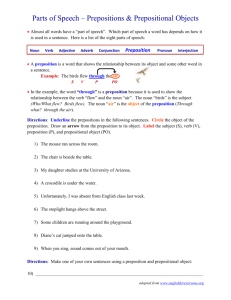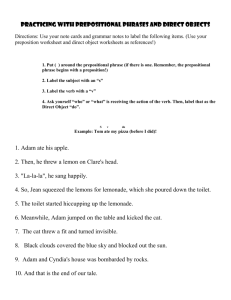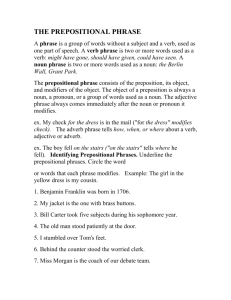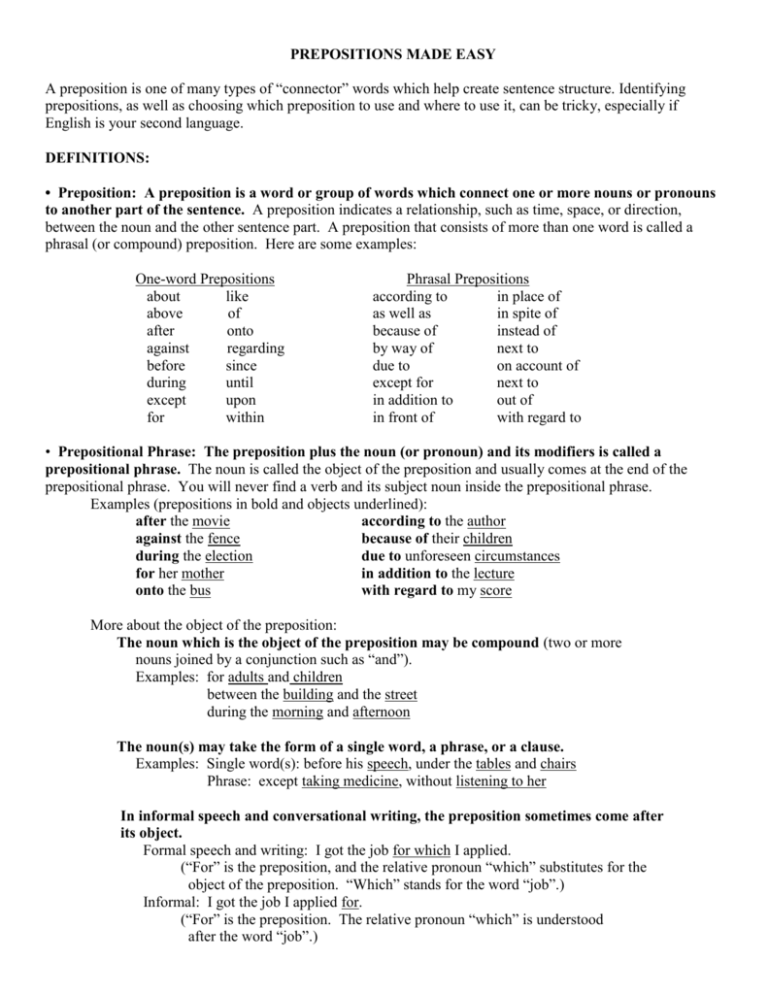
PREPOSITIONS MADE EASY
A preposition is one of many types of “connector” words which help create sentence structure. Identifying
prepositions, as well as choosing which preposition to use and where to use it, can be tricky, especially if
English is your second language.
DEFINITIONS:
• Preposition: A preposition is a word or group of words which connect one or more nouns or pronouns
to another part of the sentence. A preposition indicates a relationship, such as time, space, or direction,
between the noun and the other sentence part. A preposition that consists of more than one word is called a
phrasal (or compound) preposition. Here are some examples:
One-word Prepositions
about
like
above
of
after
onto
against
regarding
before
since
during
until
except
upon
for
within
Phrasal Prepositions
according to
in place of
as well as
in spite of
because of
instead of
by way of
next to
due to
on account of
except for
next to
in addition to
out of
in front of
with regard to
• Prepositional Phrase: The preposition plus the noun (or pronoun) and its modifiers is called a
prepositional phrase. The noun is called the object of the preposition and usually comes at the end of the
prepositional phrase. You will never find a verb and its subject noun inside the prepositional phrase.
Examples (prepositions in bold and objects underlined):
after the movie
according to the author
against the fence
because of their children
during the election
due to unforeseen circumstances
for her mother
in addition to the lecture
onto the bus
with regard to my score
More about the object of the preposition:
The noun which is the object of the preposition may be compound (two or more
nouns joined by a conjunction such as “and”).
Examples: for adults and children
between the building and the street
during the morning and afternoon
The noun(s) may take the form of a single word, a phrase, or a clause.
Examples: Single word(s): before his speech, under the tables and chairs
Phrase: except taking medicine, without listening to her
In informal speech and conversational writing, the preposition sometimes come after
its object.
Formal speech and writing: I got the job for which I applied.
(“For” is the preposition, and the relative pronoun “which” substitutes for the
object of the preposition. “Which” stands for the word “job”.)
Informal: I got the job I applied for.
(“For” is the preposition. The relative pronoun “which” is understood
after the word “job”.)
FUNCTIONS: A prepositional phrase may function as a(n) adjective, adverb, or noun.
▪ An adjective prepositional phrase modifies a noun or pronoun. A prepositional phrase used as an
adjective nearly always follows what it modifies.
Examples: The president of the country will arrive soon. (modifies the noun
“president”)
One of her brothers lives in New York. (modifies the pronoun “one”)
▪ An adverb prepositional phrase modifies a verb, verbal, or an adjective. A prepositional phrase
used as an adverb may sometimes be placed away from the word it modifies if the meaning of the
sentence is clear.
Examples: Modifying verbs:
The fish swam lazily in the shallow water.
(modifies the verb “swam”)
The jury presented their verdict after two hours of deliberation.
(modifies the verb “presented”)
Modifying verbals:
To sail around the world was his passionate dream.
(modifies the infinitive “to sail”)
The woman talking on the phone is my aunt.
(modifies the participle “talking”)
Modifying adjectives:
The crowd was upset by the delay.
(modifies the adjective “upset”)
▪ A noun prepositional phrase is used occasionally at the beginning of the sentence as the subject of
the verb or after the verb, usually as the object of a preposition.
Examples: Before Tuesday will be best for me. (acts as subject)
The bacteria gather nutrients from within deep-sea vents.
(acts as the object of the preposition “from”)
Hopefully you are now familiar with prepositions and prepositional phrases and the jobs
they do in the sentence. But there is more to learn!
▪ When is a preposition not a preposition? A word may be a preposition in one sentence but not in
another. To identify a preposition, look for the noun it connects to the rest of the sentence. The words
“near”, “off”, and “up” are commonly used as prepositions, but the following sentences show how these
words can also function as other parts of speech.
near: The hotel was located near the convention center. (preposition)
As the holiday drew near, the children became excited. (adverb)
His near escape left him breathless and frightened. (adjective)
up:
The old man trudged slowly up the hill. (preposition)
The dog looked up at his master. (adverb)
Look up the word in the dictionary. (verb particle)
off:
The swimmer jumped off the highest diving board. (preposition)
The paint wore off after two years. (adverb)
Turn the switch from off to on. (noun)
The nurse is off for three days. (adjective)
Copyright © Tacoma Community College Writing Center. All rights reserved.

